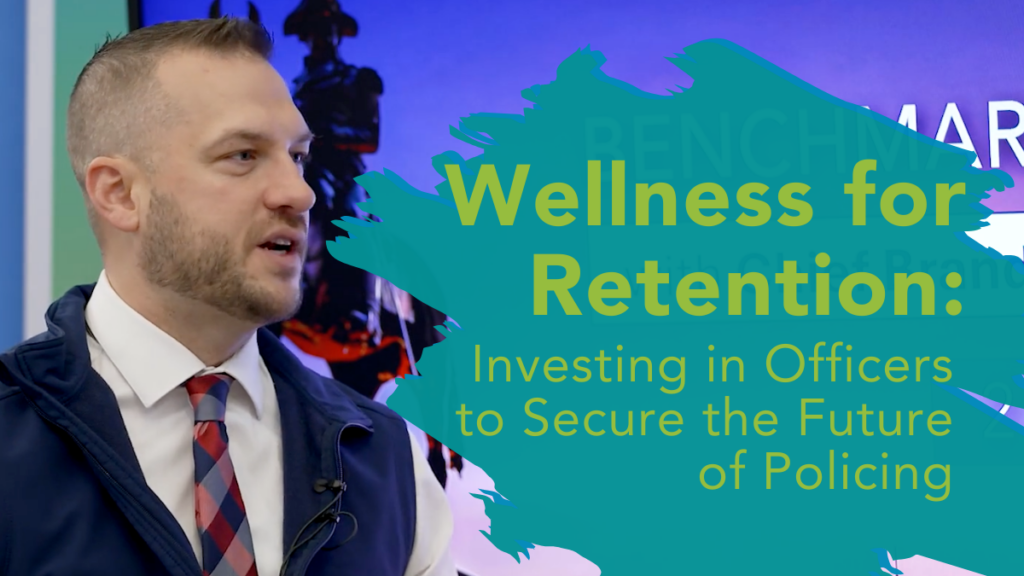The future of policing depends on the well-being of our officers. Law enforcement leaders across the nation grapple with the daunting issues of recruitment and retention, yet one solution remains underexplored but profoundly impactful—comprehensive wellness programs. These initiatives not only support officers in managing the physical and mental toll of their work but also significantly improve job satisfaction and organizational culture, making agencies more attractive to potential recruits.
Chief Brandon Silgjord, IACP 2024 40 Under 40 awardee, aptly described the challenge and opportunity during a discussion at IACP 2024.
“Recruitment and retention are on every leader’s mind, but we can’t just fill positions; we need to focus on creating a culture that officers want to be part of,” he shared.
This article and our interview with Chief Silgjord explore how wellness programs go beyond immediate support, transforming the policing experience and playing a vital role in retaining valuable talent in today’s competitive workforce.
The Case for Investing in Officer Wellness
The impact of policing on mental and physical well-being has been extensively studied. With officers exposed to high stress, trauma, and unpredictable working conditions, their careers often come with emotional and physiological challenges. Failing to address these issues not only harms officers’ health but also jeopardizes the operational readiness and public trust in agencies.
Chief Silgjord emphasized the importance of cultural change, noting how vulnerability and openness can create a more supportive environment.
“It’s okay for a chief or officer to be human. We’ve all dealt with things that shape us, but by showing that humanity, we encourage others to seek help when they need it,” – Chief Brandon Silgjord
Why Addressing Wellness Reduces Attrition
Investing in wellness is a key strategy for retention within law enforcement. Research and departmental feedback have shown that agencies with holistic wellness initiatives experience:
- Improved Job Satisfaction: Officers who feel supported and valued will likely remain committed to their agency.
- Fewer Absenteeism Issues: Proactive care reduces stress-related illnesses and burnout, keeping officers on the job.
- Enhanced Performance: Wellness programs improve decision-making, focus, and overall job performance.
- Stronger Unity and Morale: Supporting wellness fosters trust and a sense of community, making officers feel part of something greater than themselves.
Agencies that prioritize these outcomes gain a competitive edge in attracting the next generation of officers looking for workplaces that genuinely care about their well-being.
Designing Comprehensive Wellness Programs
Effective wellness programs are not a one-size-fits-all solution. They require thoughtful planning, leadership support, and an understanding of officers’ unique needs. Here are key elements agencies can incorporate:
1. Physical Health Support
Policing is a physically demanding job, and maintaining fitness is crucial for operational readiness. Agencies can implement:
- Access to gyms or fitness facilities.
- Partnerships with nutritionists to promote healthy living.
- Annual physical fitness assessments to monitor health.
2. Trauma-Informed Mental Health Resources
Due to the nature of their work, law enforcement officers are exposed to higher levels of trauma than many other professions. Mental health initiatives center around:
- Regular check-ins with culturally competent clinicians who understand the unique challenges of policing.
- Accessible therapy programs, including virtual counseling, ensure help is always available.
- Preparedness for critical incidents, such as anniversaries of traumatic events or major crises, where supervisors prioritize outreach.
3. Stress Reduction and Resilience Training
Building resilience is essential for long-term sustainability in law enforcement roles. Programs provide:
- Breathing and mindfulness exercises are proven to lower stress levels.
- Sleep hygiene tools to combat fatigue and mental exhaustion.
- Peer support networks for officers to share experiences in a safe and non-judgmental environment.
4. A Focus on Leadership and Culture
Leadership sets the tone for the entire agency’s culture. Chief Silgjord highlighted the critical role of vulnerability in shaping positive environments. “Leaders today need to connect on a human level to shift the culture in ways that the next generation of officers can rally behind.” Agencies can promote wellness through:
- Training supervisors on empathetic and proactive communication.
- Building a wellness bureau to oversee and manage resilience programs for the team.
- Celebrating and normalizing conversations about stress and mental health.
5. Data-Driven Insights
With technological advancements, agencies can now analyze trends and anticipate wellness needs. For instance:
- Wellness Software can monitor metrics like increased time off, correlating them to indicators of burnout.
- Systems can alert supervisors to follow up with officers around significant events, ensuring timely intervention.
- Agencies like those inspired by Chief Silgjord’s approach implement dashboards to track progress and measure the impact of wellness initiatives.
Success Stories in Law Enforcement Wellness
Chief Silgjord’s leadership in Sartell, Minnesota, is a testament to the power of investing in wellness. Among his many achievements, he developed a new organizational structure to alleviate burnout and ensure optimal staffing levels. Additionally, he introduced therapy-focused K9 units to assist officers in processing trauma while engaging positively with the community.
Agencies around the nation are seeing similar results with dedicated wellness efforts. Organizations that prioritize their people consistently see improved retention rates, increased recruitment success, and enhanced officer satisfaction.
“Policing can be rough, but the way we support each other can make all the difference.” – Chief Brandon Silgjord
Moving Forward with Wellness in Policing
Bold leadership and empathetic strategies are key to transforming law enforcement agencies into wellness-first organizations. By caring for their officers’ minds and bodies, agencies create a productivity, trust, and belonging culture. This approach not only helps keep departments staffed and motivated but also builds stronger bridges with the communities they serve.
If you want to learn more about comprehensive officer wellness programs or explore solutions tailored to your agency, connect with our team today. Together, we can make every department a better place for those who dedicate their lives to keeping us safe.
